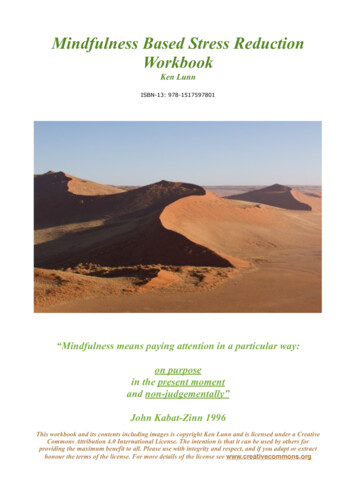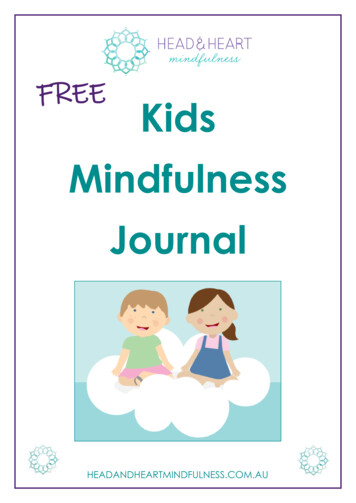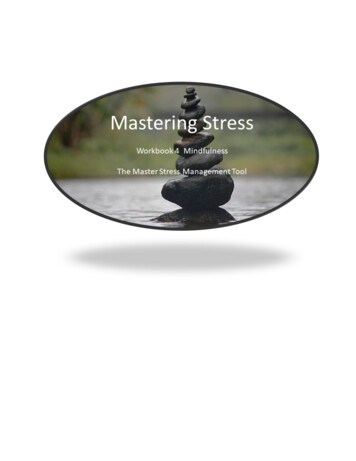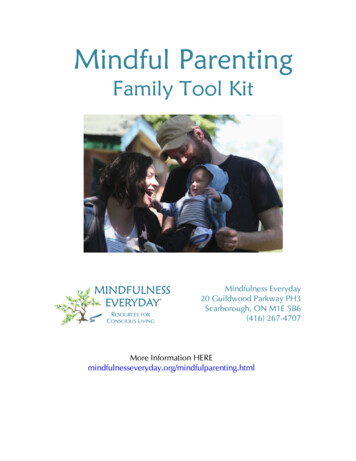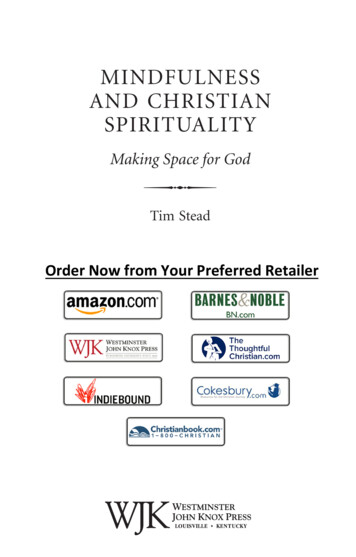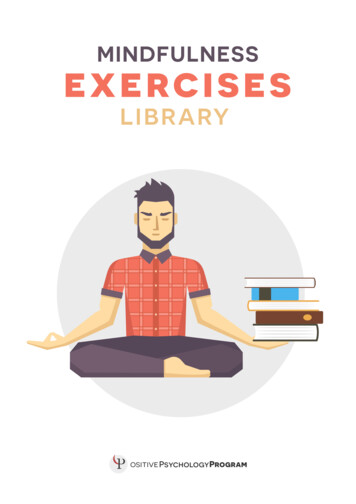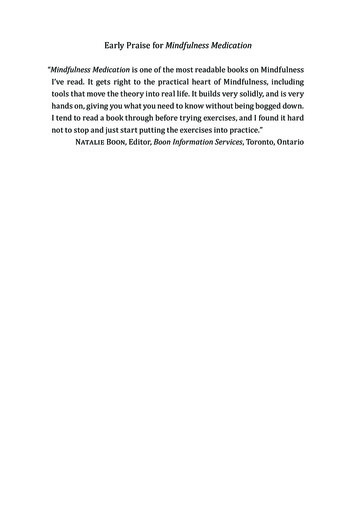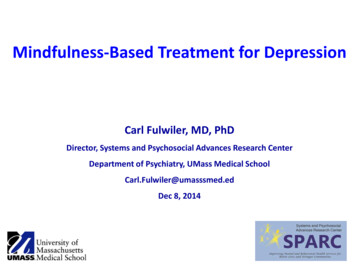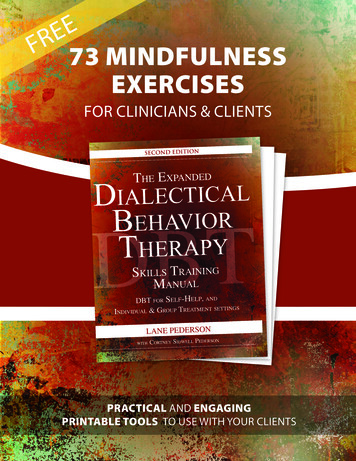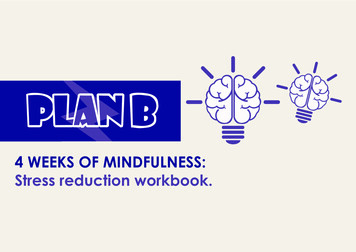
Transcription
4 WEEKS OF MINDFULNESS:Stress reduction workbook.
INTRODUCTION1This work book gives you the basic skills of adopting a mindful mentality.Mindfulness helps us become aware of our emotions and helps us manage them in a healthy way.It may well be that your reason for being in prison is because you have reacted to anger, frustration, or stress in anegative unhealthy way and that the consequence has resulted in an unpleasant experience for you. It may also bethat this cycle of behaviour (working off your stress and anger emotions) continues to get you into difficult situations inprison. The aim of this workbook is to give you awareness of these emotions so you can put in to place simple practicesto help balance yourself and importantly help you to look after your mental health. This can prevent further punishmentand loss of privileges. When you learn to work off your ‘relaxation’ response rather than the ‘stress’ response you willdramatically improve the quality of your everyday life.This work book sets you tasks over a 4 week period, in the form of meditation, breathing exercises, and cognitivebehavioural tasks. Each week you will be asked to practice the various tools you have been taught and put them intopractice. To help you get the most from this workbook it is essential that you commit to practicing and be open andhonest about your thoughts and feelings. This workbook is for you, no one else needs to read it or mark it. So there areno right or wrong answers. It’s how you experience things and how you feel about them.AboutUs:Plan B is a provider of mindfulness training and wellbeing activities. We teach a wideaudience from children to senior citizens. We run courses in schools, colleges, corporations andinstitutions. We also specialise in using mindfulness to help with mental health conditions andthose recovering from addiction. In time we hope to have trained all the staff at Wandsworth aswell as giving all inmates access to mindfulness training with the hope of creating a mindful,respectful and productive environment.
BENEFITS OF BEING MINDFULA reduction in levels of stress, depression, anxiety and angerIncreased productivity and creativityControl over your thoughts and reactionsAdopting a positive mindsetBetter physical healthEnhanced communication and relationshipsIncreased concentration and attention spanA greater capacity to hold and work with informationImproved sleeping patterns2
WHY MINDFULNESS AT WANDSWORTH?Stress can make us ‘act out’and this can cause us to loseprivileges – using this age oldtechnique will help you takecontrol.1 in 4 UK adults willexperience issues withtheir mental health.Mindfulness is great formanaging andpreventing mentalhealth issues3Prison life can be frustratingboring and mundane. You willfind how to adopt a positivemindset and stay in themoment, worrying less aboutthe past and future.The benefits of mindfulness notonly improve your prison life butalso helps you manage stress inyour personal life and improverelationships on the outside.
4WHAT IS MINDFULNESS?Bestdefinition"paying attention on purpose,in the present moment, andnonjudgmentally, to theunfolding of experiencemoment to moment’’Jon Kabat-ZinnFounder of Mindfulness-Based Stress Reduction.Mindfulness is a mix of - Meditation and Cognitive Therapy, and is based on a25,000 year old Buddhist practice, but given a modern, secular twist. It is not areligion, it is a series of tools and techniques to help better yourself.Mindfulness teaches you to be in the moment – not look into the future or dwellon the past. You learn to control your thoughts, sit easily with negative feelingsand become aware of your thoughts, feelings and physical sensations.Anyone can practice mindfulness in everyday life no matter what age or ability.
5WEEK 1Fill in your thoughts below.What was it that brought you to HMP Wandsworth?What was the emotion that brought you here? (Anger, Fear, Frustration etc.)What do you think Jon Kabat- Zinn means by ‘Letting it be’?It’s not a matter of lettinggo - you would if youcould. Instead of ‘Let it go’we should probably say“Let it be.”Jon Kabat - Zinn
6BREATHEIn mindfulness practice we always start by focusing on the breath. Why? The breath is always withus; we all know how to breathe. So we can use this simple tool any time any place anywhere.Sit in an upright position, feet on the floor, hands on your lap(or cross-legged on the floor if you can). Be aware of your posture,sit in a dignified manner.Close your eyes.Breathe into your abdomen (place a hand on your belly button) andnotice the rise and fall of your stomach as you breathe in an out.Notice as you breathe in (inhale) how it feels tight and tense in yourstomach, and how this softens and relaxes when you breathe out.Repeat this as many times as you want.
NOTICE7Fill in your thoughts below:In this very moment, how do you feel right now?(i.e. Angry, Bored, Stressed, Sad, Calm?)Bring your attention to your body – where can you feel this emotion?Thoughts(i.e. racing heart, tension in hands, churning stomach, heaviness?)MindfulAwarenessOur thoughts, feelings and physical sensations all work together,being aware of them is the first step to taking control of them.Have you noticed the physical sensation to your emotions before?EmotionsSensations
SOBER BREATHING SPACEWhen was the lasttime you reacted ina bad way to astressful situation?8Play this event over in your mind. Notice how you feel just thinking about it.Now using the steps of the SOBER breathing space, replay the event in your mind.Respond to the situation more mindfully. You can use these steps the next time you are ina stressful situation.STOP- When you find yourself in a stressful or risky situation, stop, slow down and check in with what’shappening.OBSERVE - Observe the sensations that are happening in your body. Observe your emotions, moods andthoughts. Observe the other people involved in the event.BREATHE - Clear your mind of the event and do nothing but focus on your breathing.EVALUATE- Return to the scene, ask yourself what is actually happening and expand your awareness tohow your body feels. Keep gently aware of this.RESPOND - (rather than react) mindfully, with awareness of what is truly needed in the situation and howyou can best take care of yourself. Whatever is happening in your mind and body, you still have a choiceto respond. What can you do now to diffuse this and not land yourself in trouble?
BREATH MEDITATION9Lets deepen our meditation practice. At the beginning we learned how to breathe to bring ourselves into the presentmoment. Now we notice our wandering mind and give it a job. Every time you lose focus on this meditation, simplyreturn your focus to the breath and where you feel it the most- be curious. Don’t beat yourself up about losing yourfocus – be pleased that you are aware, and kindly refocus your attentionSit upright.Feet on the floor, hands on your lap. Close your eyes and focus on yourbreathing.Be curious about the journey of the breath and discover where you feelthe breath the most.Breathe inSome people notice the rise and fall of their stomachs or the air aroundtheir nostrils.Focus on the breath continuously.When you notice your mind has wandered off, bring your attention backto the breath.Breathe out
REFLECTION10WILD GEESEYou do not have to be good.You do not have to walk on your knees.For a hundred miles through the desert, repenting.You only have to let the soft animal of your bodylove what it loves.Tell me about despair, yours, and I will tell you mine.Meanwhile the world goes on.Meanwhile the sun and the clear pebbles of the rainare moving across the landscapes,over the prairies andthe deep trees,the mountains and the rivers.Meanwhile the wild geese, high in the clean blue air,are heading home again.Whoever you are, no matter how lonely, the world offersitself to your imagination, calls to you like the wild geese,harsh and exciting — over and over announcing yourplace in the family of things.What do you think this poem is trying to teach us?:
PRACTICE11To make mindfulness a part of everyday life, we need to practice. If you want to build muscles you go to the gym daily.If you want a strong mind you need to meditate daily. You are now teaching your brain to work in a different way. Atthe beginning it may not be easy, but even practising 5-10 minutes a day will help.Practice sitting with the breath daily.Track your progress daily using the chart on the following page.Practice SOBER breathing space when you are about to beconfronted with a stressful event.Ask yourself daily. How am I feeling right now in this very moment?What physical sensations can I feel right now in my body?Fill out the ‘pleasant experiences’ calendar to help you becomeaware of what the small joys are in everyday life.
PRACTICE – BREATH MEDITATIONDAYLENGTHExample10 ndayCOMMENTSI was feeling frustrated today and noticed I couldn’t keep my focus well.I felt the frustration in my belly. I will try again later.12
PRACTICE – PLEASANT EXPERIENCESWhat was theExperience?I had a visit from friends13Where you aware of thepleasant feelings whilethe event was happening?How did your body feel,in detail, during thisexperience?What moods, thoughtsan feelingsaccompanied this event?What thoughts are in yourmind now as you writeabout this event?Yes, I was excitedbefore hand, I was happybefore I saw him.Jumpy, buzzing,my fingers where tinglingI felt joy, excited, fulfilled– I had lots to talk about,I missed themIt makes me smile, I stillfeel jittery, but also feela bit sad now.
14WEEK 2Fill in your thoughts belowHow do you feel right now in this very moment?Where do you feel this sensation in your body?What are your goals and intentions from using this mindful workbook?Neurologists claim thatevery time you resistacting on your anger,you’re actually rewiringyour brain to be calmerand more loving.
15BODYJust as we focused on the breath last week – this week we bring our awareness to our bodies and physicalsensations. Often our body reacts to our thoughts and feelings, so if I feel angry – I am also going to feel thatanger in my body, i.e. racing heart, tense muscles, heat.You can choose to lay down or sit.Bring your focus to your feet – what can you feel right now in your feetand toes?Squeeze your toes and feet and hold that squeeze for 5 seconds.Notice how your feet feel in this tense state (Painful? Hot? Tingles?)Next slowly release that tension and soften the toes and feet.Notice how they feel now in this relaxed state. (Tired? Floppy? Warm?)Travel up the body squeezing and releasing each part of your bodysection by section all the way up your body until you are squeezing andreleasing your head and face last)Finally squeeze your whole body and hold this for 5 seconds beforereleasing and noticing how your whole body feels.
NOTICE16Fill in your thoughts below:In this very moment, how do you feel right now?(i.e. Angry, Bored, Stressed, Sad, Calm?)Bring your attention to your body – where can you feel this emotion?Thoughts(i.e. racing heart, tension in hands, churning stomach, heaviness?)MindfulAwarenessOur thoughts, feelings and physical sensations all work together, being awareof them is the first step to taking control of them. See your thoughts as justmental events and focus on breathing into the physical sensation instead.What do you notice now?EmotionsSensations
MINDFUL MOVEMENTTry these simple yoga poses and stretches daily.When moving mindfully we move very slowly andfocus all our attention on the breath and body.Notice how your body feels moment to momentand remember to breathe into each movement.By being focused, slow and controlled we aretuning this activity into a meditation. If your mindwanders off and you lose focus, just kindly return tothe movement.This is not a fitness exercise or a test of yourstrength. The goal is to focus your mind, listen toyour body’s limits and try not to push yourself toofar.What other movements can you do mindfully?17
REFLECTION18THE GUEST HOUSEWhat do you think this poem is trying to teach us?:This being human is a guest house.Every morning a new arrival.A joy, a depression, a meanness,some momentary awareness comesas an unexpected visitor.Welcome and entertain them all!Even if they’re a crowd of sorrows,who violently sweep your houseempty of its furniture, still,treat each guest honourably.He may be clearing you outfor some new delight.The dark thought, the shame, the malice,meet them at the door laughing,and invite them in.Be grateful for whoever comes,because each has been sentas a guide from beyond.
PRACTICE19Over coming week use the practices to learn how to focus on the body. We use the body to help us work through stressand anger, rather than overthinking the situation in our head, instead we direct our focus to the feelings of anger in thebody. This way we aren’t ignoring the fact we are angry, but we are dealing with it in a heathier way.Practice sitting with the breath daily.Practice the body scan – squeeze and release technique, or see ifyou can take it further by paying attention to the sensations in finedetail, i.e. focusing on the big toe, each finger, the elbow, the nosePractice mindful movement – discover other moves and stretchesyou can do mindfully. It doesn’t have to be the whole body, one armwill do!Ask yourself daily. How am I feeling right now in this very moment?What physical sensations can I feel right now in my body?Fill out the ‘unpleasant experiences’ calendar to help you becomeaware of what the small joys in everyday life.
PRACTICE – BODY MEDITATIONSDAYLENGTHExample20 ndayCOMMENTSThis morning I tried the yoga moves – I was pleased at how far I could pushmyself. I did 5 mins of the body squeeze. I like using it when I’m annoyed.20
PRACTICE – UNPLEASANT EXPERIENCESWhat was theExperience?Stuck in my cell fortoo long!Were you aware of theunpleasant feelings whilethe event was happening?No – but now I think backon it, I made myself worseby pacing up and downHow did your body feel,in detail, during thisexperience?Nervous, tingly vibrations,restless, pacing21What moods, thoughtsand feelingsaccompanied this event?What thoughts are in yourmind now as you writeabout this event?Anger, frustration,restlessness – I thought theguards had forgotten me.I wound myself up, I wasstressed and angry but itwasn’t helpful.
WEEK 322Fill in your thoughts belowIn this very moment, how do you feel?In this very moment, what sensations can you notice in your body?One minute ofanger weakens yourimmune system for4-5 hours.One minute of laughterboosts your immunesystem for over24 hours.Can you think of a recent example of when you reacted to anger?What was the result, and how did it make you feel?
LISTENTry this listening practice – using sound as ourfocus, see if you can tune-in to the many soundsaround you without getting lost in thought orjudging the sound as good or bad just listen!Sit in your dignified position – feet on the floor or cross-legged.Close your eyesStart by focusing on your breath.Gently turn your focus to the sounds that you can hear within your body.Do not label or judge the sound as good or bad – just listen to the sounds.Widen your focus to the sounds you can hear inside your room.Listen to the sounds, just as they are- low/high pitch sounds, rumbles, vibrations.Widen your attention to the sounds you can hear in the wing.Don’t tune-in or get attached to voices or conversations – just listen to the sound the voices make.Widen your focus now to listening to sounds outside of the prison.Try not to label the object making the sound i.e. car, plane, – this will lead you to lose your focus.Just like any mediation, if your mind wanders off, acknowledge it and return to your focus point.23
NOTICEWe can get dragged down by our daily routine, especially in the prison regime.We can sometimes go from one boring depleting task to another, and leave little time to dothe things we enjoy.Use this exercise to take a look at how you are spending your days and ask whether you aremaking the most of them.Write down your daily routine (from waking up to going to sleep and everything in between)and add whether you find this ‘event’ nourishing or depleting (marking each activity with anN or D) nourishing means it is a task you enjoy or benefit from, depleting is a task that youdislike, or find dull.I.E: Wake Up (D), Brush Teeth (N), Drink Coffee (N).Afterwards reflect on your answers, do you have more N’s than D’s?When do you need to include more nourishing tasks to your day?What D’s can you change into N’s by just bringing about a positive mindset.I.E. I hate going to education, but I know its going to give me skills to better myself.How do you spend your day?24
NOURISHED OR DEPLETEDMY DAYN or D25MY DAYN or D
TASTE26Bring new awareness to everyday tasks by doing them mindfully – try this practice when you have your snack.Bring complete focus and attention to it.What did you notice?MINDFUL EATINGTake your chosen snack (fruit, biscuit etc.)Sit in a dignified position and give all your attention to the object.How does it feel in your hand? – rough or smooth textureWhat thoughts and emotionsaccompanied this?How does the object look? – explore every detailHow does the object smell? – close your eyes to increase your sense of smellDoes the object have a sound? - roll and rub the object next to your ear.What thoughts are coming up? What emotions? Can you notice your body responding?What other everyday activities couldyou perform mindfully?Take a slow bite of the object and keep it on your tongue – how does it feel?Explore the object with your tongue – moving it against your teeth, your gums, your mouth.Slowly and gently begin to chew.Be curious about how your body acts – and what you notice moment to moment.Hold the food on your tongue – notice your control over your physical responsesGently swallow the food and follow the journey of the food as it leaves your mouth.
PRACTICE27Sometimes we make every excuse under the sun not to practice, even when we know the task is good for us. Askyourself, why is it that you choose to not nourish your mind and better yourself?This week pay attention to sound and the art of just listening.Practice sitting with the breath daily.You can do the N/D task daily if you like, see how each day changeswhen you make yourself aware of adding more nourishment to yourday.Practice the sound meditation, 5- 20 mins of just listening to thesounds around us calm our senses, why not try and re-listen to yourfavourite song. This time close your eyes and listen – really payattention to the sounds.Try mindful eating each time you have a snack, or try out newactivities that you can do mindfully (washing your face, drawing,exercising or cleaning).
PRACTICE SOUND OR MINDFUL ACTIVITYDAYLENGTHExample5 ndayCOMMENTSI brushed my teeth mindfully, I noticed how the mint taste tingles my gumsand how my whole body works when I brush my teeth28
29WEEK 4Fill in your thoughts belowOur actions don’t just effect us, think about the situation that brought you toWandsworth or even the last situation that you acted out of anger – apart from yourself,who else would have been effected emotionally and physically by your actions?Who do you miss the most, bring them to mind. What thoughts andphysical feelings accompany that memory?What are the positives of being in HMP Wandsworth?Train your mind tosee the good inevery situation
30VISUALISEJust as we focused on the breath last week – this week we bring our awareness to our bodies and physicalsensations. Often our body reacts to our thoughts and feelings, so if I feel angry – I am also going to feel thatanger in my body, i.e. racing heart, tense muscles, heat.Sit in your dignified position.Feet planted on the floor, hands on your lap.Think of a shape that could represent your emotion. (Sad – Circle, Anxious – Triangle)Then think of a colour for the shape that best represents your emotion.(Anger – Red, Pain – Blue)Now visualise this coloured shape hanging in front of you – like a pendant dangling on apiece of string.Close your eyes and begin to breathe/blow gently onto the shape, imagine it movingwith your breath.Imagine as you exhale, your breath begins to slowly turn the shape white.Use your breath to spray paint the shape slowly back to a clean shiny white shape.Don’t rush it.Once the shape is white again assess whether you are feeling better or if the shapeneeds a respray.
REFLECTIONFor this task you are asked to write a letter to yourself. The aim is to show yourself love and compassion. Humansare very good at giving love and kindness to others but lack the ability to honour ourselves in the same way.Write a letter to yourself in the box below, praise your good qualities, identify what is unique about yourself.Finally show compassion to yourself for mistakes you have made in the past.Dear .31
VISUALISEIt can be frustrating being separated from ourloved ones. Connect with your friends and familyusing this ‘Metta’ meditationClose your eyes and bring to mind a close friend or relative(someone you have an uncomplicated relationship with)How do they look? What are they wearing? Where are they?Imagine yourself in the same room as that person.Begin speaking to this person and sending them good thoughts and kindwishes.Tell that person how much they mean to you and think aboutwhat you wish for them.You might wish them health, success, happiness and joy.How does that person respond to these kind words from you?Now repeat this process but imagine your friend/loved one sending you backkind and loving thoughts and messages.What would they say to you, what would they wish for you?How do they look when they say it?How does this make you feel?End the practice by letting go and return to focusing on your breath torestore balance and focus.32
33REFLECTIONAWAKENING NOW (DANNA FAULDS)Why wait for your awakening?Do you value your reasons for staying small more thanthe light shining through the open door?Forgive yourselfForgive yourself.Now is the only time you have to be whole.How does this poem make you feel?Now.Now is the sole moment that exists to live in the light ofyour true nature.Perfection is not a prerequisite for anything but pain.Perfection is not a prerequisite for anything but pain.Please, oh please, don't continue to believe in yourstories of deficiency and failure.This is the day of your awakening.
PRACTICE34This week we focused on visualising positive events. This helps us to feel more positive about things and when we areuplifted and happy, we are less likely to act out in stress. See if you can deepen your mindful practice this week byfocusing for longer. Try and see if you can make a meditation last at least 20 minutes.Practice sitting with the breath daily.Anytime you have a negative emotion (sadness, fear, anxiety, anger,pain) use the shape and colour exercise.Practice the love and kindness meditation (Metta) daily. Bring tomind different people you love. Past and Present. Can you do thisby visualising you talking to your 8 yr old self?On the back of this page write a mindful poem about your emotions– making sure to add thoughts, emotions, and physical sensations.Try and visualise these objects to give you a boost.Mountain – StrengthLion – CourageOld Oak Tree – WisdomRunning Stream - Calm
PRACTICE VISUALISATIONDAYLENGTHExample15 ndayCOMMENTSMy daughter starts school today, I spent some time visualising her gettingready and I sent her words of encouragement. I will phone her later!!35
REVIEW36What have you learned about yourself duringthese 4 weeks?Did you find time to practice the tools daily? What barriersprevent you from practicing – how can you change this?Which of the practices did you findhelped you most?What positive changes have you madeover the last 4 weeks ?Which practice did you struggle with? How can youmake it a better experience.How do you intend to continue yourmindful practice?
REVIEW37YogaCounsellingMindfulness CourseFitnessNutritionMental health workshopsConnecting with familyPoetryLearn a new skillMeditationContinue your practices to adopta mindful mindset and take onnew growth challenges!
First produced and published in Great Britain in 2016by Sonya Russo, Waves Mindfulness.Copyright Wave Mindfulness 2016Copies only to be distributed byHMP Wandsworth 2016 - 2017 as part of theWaves Mindfulness Stress Reduction Course
WHAT IS MINDFULNESS? Mindfulness is a mix of - Meditation and Cognitive Therapy, and is based on a 25,000 year old Buddhist practice, but given a modern, secular twist. It is not a religion, it is a series of tools and techniques to help better yourself. Mindfulness teaches you to be in the moment - not look into the future or dwell on the past.
